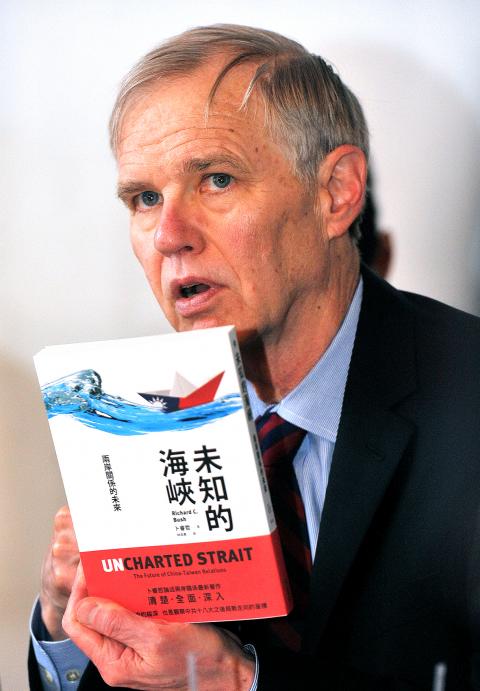|
Beijing should not ‘push political
talks’
By Shih Hsiu-chuan / Staff reporter

Former American Institute in
Taiwan chairman Richard Bush holds a copy of the Chinese edition of his book
"Uncharted Strait: The Future of China-Taiwan Relations" at a book launch in
Taipei yesterday.
Photo: Chien Jung-fong, Taipei Times
Since there are still serious “conceptual”
differences between Taiwan and China, and Taiwanese are not ready to explore
cross-strait engagements in areas beyond the economy and trade, Beijing should
not push Taipei to hold talks on political and security issues, former American
Institute in Taiwan chairman Richard Bush said in Taipei yesterday.
Bush said he was “rather pessimistic” that cross-strait negotiations would move
beyond the relatively easy economic issues into political and security matters
during President Ma Ying-jeou’s (馬英九) remaining time in office, which overlaps
significantly with Chinese President Xi Jinping’s (習近平) term.
Some in China would like to see this turning point in the development of
cross-strait ties happen during Ma’s second term, but Bush said he did not
expect this would occur for two reasons.
“One is that it is clear to me that the Taiwanese public is not ready for that
turning point. Second, I think that there are still important conceptual gaps
between the two sides,” he said.
At the center of the conceptual disagreements between the two countries is the
issue of whether China is willing to accept the existence of the Republic of
China (ROC), Bush said.
“I hope that Beijing is not pushing [Taipei] on this. Some of its policymakers
are very patient on this [matter] and I hope that their patience continues,” he
said.
Bush, who is the director of the Brookings Institution’s Center for Northeast
Asian Policy Studies in Washington, is in Taipei to launch the Chinese edition
of his book Uncharted Strait: The Future of China-Taiwan Relations, the third in
his trilogy about Taiwan.
At the book launch, Bush praised cross-strait rapprochement in the five years
since Ma took office and attributed the progress to both Ma and former Chinese
president Hu Jintao (胡錦濤), whom he said had taken “certain risks” to reduce the
level of “mutual fear” trapping both sides over the past 10 to 15 years.
China’s recent push for bilateral talks on issues involving eventual
unification, as stated in Hu’s work report to the Chinese Communist Party’s 18th
National Congress, has brought political issues to the forefront of cross-strait
negotiations, exerting pressure on Ma to deal with the sensitive topics, he
said.
Bush said he did not think a reversal in cross-strait ties was likely because
there is a still much work to be done in economic areas and perhaps also in the
cultural sector.
“Maybe a little bit more likely is that since the momentum will slow down, it’s
possible that some mistrust could develop because of that,” he said.
“But I hope that won’t happen,” Bush said. “I think there is still a lot to do
in the economic area and particularly important is that the two sides implement
well the agreements that have already been reached [in the past five years], and
so feel confident that it’s worth moving forward to other types of agreements.”
Bush said that Beijing could eventually change its approach toward Taiwan from a
“paradigm of mutual persuasion,” under which each side needs to communicate
clearly what it needs in their interactions, to a “paradigm of power asymmetry”
to seek its ultimate goal of unification through pressure and intimidation.
Bush said he did not think this would happen in the next few years, but it might
happen if the Democratic Progressive Party returns to power, or if Beijing for
some reason loses patience with the Chinese Nationalist Party (KMT) government.
Asked about Taiwan’s military investment, Bush said it is important for the
nation to develop a defense and security strategy that reflects the threats
facing it.
He added that it is appropriate for military authorities to look into the local
production of advanced fighter aircraft and submarines in light of the current
threats the country has to deal with and its budgetary situation.
Asked about his views on a cross-strait peace accord, Bush said it was “fairly
unlikely” that such a pact would be signed in the near future.
“To sign a peace accord, you will probably have to have a precise definition of
‘one China,’ something more explicit than the [so-called] ‘1992 consensus.’ That
gets you again to the issue of the ROC, which is very difficult,” Bush said.
It is not clear how much Taiwan’s security would be improved if it inked a peace
accord with China if the pact only covers intentions — such as Taiwan pledges
not to declare independence and China renounces the use of force against Taiwan
— and ignores that China continues to build up its military capabilities, Bush
said.
|
![]()
![]()
![]()